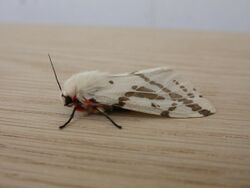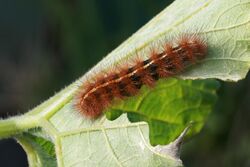Biology:Ardices canescens
From HandWiki
Short description: Species of moth
| Ardices canescens | |
|---|---|

| |
| Female imago | |

| |
| Larva | |
| Scientific classification | |
| Domain: | Eukaryota |
| Kingdom: | Animalia |
| Phylum: | Arthropoda |
| Class: | Insecta |
| Order: | Lepidoptera |
| Superfamily: | Noctuoidea |
| Family: | Erebidae |
| Subfamily: | Arctiinae |
| Genus: | Ardices |
| Species: | A. canescens
|
| Binomial name | |
| Ardices canescens Butler, 1875
| |
| Synonyms | |
|
Spilosoma canescens (Butler, 1875) | |
Ardices canescens, the dark-spotted tiger moth or light ermine moth, is a moth in the family Erebidae that is found across most of Australia . It originally was included in the genus Spilosoma, but later the generic status of Ardices was proven.[1]
The larvae are polyphagous,[2] and are known to feed on Bidens pilosa, Helianthus annuus, Taraxacum officinale, Ipomoea batatas, Alcea rosea, Rosa odorata, Plantago,[3] Ricinus communis and Tradescantia albiflora.[2] The polyembryonic parasitoid wasp Copidosoma floridanum sometimes uses this species of caterpillar as a host.[4]
References
- ↑ Dubatolov, Vladimir V. (July 2005). "On the status of the Australian genus Ardices Walker, 1855 with the description of a new subgenus for A. curvata Donovan, 1805". Atalanta 36 (1/2): 173–179, 394–395 (colour plate 10). ISSN 0171-0079. http://fen.nsu.ru/~vvdubat/pdf/Atalanta_36%281-2%29173-179_395.pdf.[yes|permanent dead link|dead link}}]
- ↑ 2.0 2.1 H. A. Rose (1985). "The relationship between feeding specialization and host plants to aldrin epoxidase activities of midgut homogenates in larval Lepidoptera". Ecological Entomology 10 (4): 455–467. doi:10.1111/j.1365-2311.1985.tb00744.x.
- ↑ Don Herbison-Evans & Stella Crossley (October 30, 2008). "Spilosoma canescens". University of Technology, Sydney. http://lepidoptera.butterflyhouse.com.au/arct/canes.html. Retrieved January 1, 2009.
- ↑ John S. Noyes (1988). "Copidosoma truncatellum (Dalman) and C. floridanum (Ashmead) (Hymenoptera, Encyrtidae), two frequently misidentified polyembryonic parasitoids of caterpillars (Lepidoptera)". Systematic Entomology 13 (2): 197–204. doi:10.1111/j.1365-3113.1988.tb00241.x.
External links
Wikidata ☰ Q15267917 entry
 |

